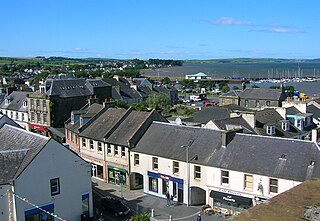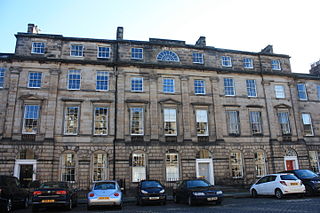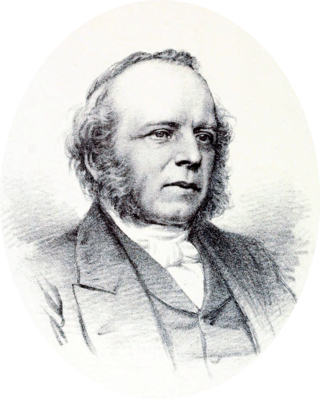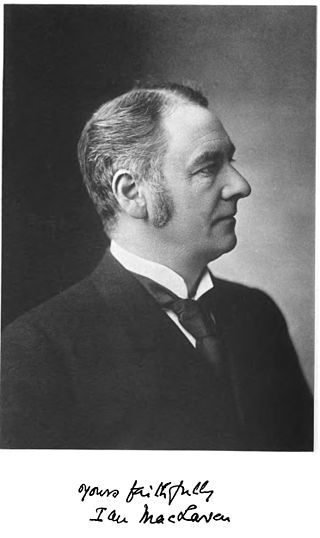
Stranraer, also known as The Toon, is a town in Dumfries and Galloway, Scotland, on Loch Ryan and the northern side of the isthmus joining the Rhins of Galloway to the mainland. Stranraer is Dumfries and Galloway's second-largest town, with a population of 10,593.
Robert Baillie was a Church of Scotland minister who became famous as an author and a propagandist for the Covenanters.

Alexander Campbell Fraser was a Scottish theologian and philosopher.

Thomas Chalmers, was a Scottish Presbyterian minister, professor of theology, political economist, and a leader of both the Church of Scotland and of the Free Church of Scotland. He has been called "Scotland's greatest nineteenth-century churchman".

Marcus Dods was a Scottish divine and controversial biblical scholar. He was a minister of the Free Church of Scotland. He served as Principal of New College, Edinburgh.

For the British colonial administrator, see Alexander Frederick Whyte

Robert Smith Candlish was a Scottish minister who was a leading figure in the Disruption of 1843. He served for many years in both St. George's Church and St George's Free Church on Charlotte Square in Edinburgh's New Town.
The United Free Church of Scotland is a Scottish Presbyterian denomination formed in 1900 by the union of the United Presbyterian Church of Scotland and the majority of the 19th-century Free Church of Scotland. The majority of the United Free Church of Scotland united with the Church of Scotland in 1929.

John Caird DD LLD (1820–1898) was a Scottish theologian. He entered the Church of Scotland, of which he became one of the most eloquent preachers. He served as the Principal of the University of Glasgow from 1873 until 1898.

Andrew Alexander Bonar was a minister of the Free Church of Scotland, a contemporary and acquaintance of Robert Murray M'Cheyne and youngest brother of Horatius Bonar.

John Watson, was a minister of the Free Church of Scotland. He is remembered as an author of fiction, known by his pen name Ian Maclaren.

David Welsh FRSE was a Scottish Presbyterian minister and academic. He was Moderator of the General Assembly of the Church of Scotland in 1842. In the Disruption of 1843 he was one of the leading figures in the establishment of the Free Church of Scotland.

Thomas Joseph Winning was a Scottish Cardinal of the Roman Catholic Church. He served as Archbishop of Glasgow from 1974 and President of the Bishops' Conference of Scotland from 1985 until his death. Winning was elevated to the cardinalate in 1994.

John Hamilton Dalrymple, 10th Earl of Stair, KT, styled Viscount Dalrymple from 1853 until 1864, was a Scottish peer and politician, who served as Governor of the Bank of Scotland for thirty-three years.

James Buchanan (1804–1870) was a preacher and theological writer. He was born in 1804 at Paisley, and studied at the university of Glasgow. In 1827 he was ordained Church of Scotland minister of Roslin, near Edinburgh, and in 1828 he was translated to the large and important charge of North Leith. In this charge he attained great fame as a preacher, being remarkable or a clear, vigorous, and flowing style, a graceful manner, a vein of thrilling tenderness, broken from time to time by passionate appeals, all in the most pronounced evangelic strain. In 1840 Buchanan was translated to the High Church, Edinburgh, and in 1843, after the disruption, he became first minister of St. Stephen‘s Free Church. In 1845 he was appointed professor of apologetics in the New College, Edinburgh, and in 1847, on the death of Dr. Chalmers, he was transferred to the chair of systematic theology, continuing there till his resignation in 1868.
The Maybole and Girvan Junction Railway was a railway company that constructed a line between Maybole and Girvan. Although promoted independently, it was supported by the Glasgow and South Western Railway, and was seen as part of a trunk line connecting Glasgow with a ferry port for the north of Ireland.

Sir George Washington Browne was a Scottish architect. He was born in Glasgow, and trained there and in London. He spent most of his career in Edinburgh, although his work can be found throughout Scotland and beyond. He was involved in nearly 300 projects, including many public and commercial buildings. One of his most notable buildings is Edinburgh's Central Library, and he became recognised as an authority on library planning and design. He came to national attention after winning a competition to design a bridge over the River Thames in London, although this was never realised. He was the first architect to be elected as President of the Royal Scottish Academy. He also served as President of the Edinburgh Architectural Association, and was instrumental in setting up the Royal Fine Art Commission for Scotland.

Alexander R. MacEwen (1851–1916) was Scottish writer, minister, professor and Moderator of the United Free Church of Scotland.

David Brown was a son of bookseller who was twice Provost of the city. He was a Free Church of Scotland minister who served as Moderator of the General Assembly 1885/86. He was co-author of the Jamieson-Fausset-Brown Commentary on the whole Bible.

William Wilson was a Scottish minister of the Free Church of Scotland who served as Moderator of the General Assembly in 1866/67.
















